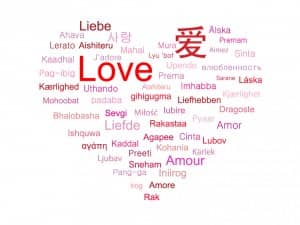The English word love comes from the Old English word lufu meaning deep affection. The word lufu is linked to the Old Frisian word luve, Old German luba and the Gothic lubo. The Indo-European root comes from the Latin lubet meaning pleasant, and lubido meaning desire.
In the beginning, in English-speaking areas, the word love was used to express affection towards god, and subsequently the affection towards a loved one. According to the relevant literature, as of 1423, people started using the expression fallen in love, and 100 years later, the word lovesick. To make love used to mean ‘to express affection’, and the modern meaning (to have sex) has been in use since the middle of the 20th century. Tennis fans know that love means zero points, which comes from the expression play for love (to play a game of cards without stakes).
There are different definitions of love, one of which says that love is a pleasant feeling a subject (person) feels towards an object they hold in high regard and consider a part of their intimate world. However, the question is – is love and being in love the same?
Is love and being in love the same?
Being in love is an intense pleasant feeling that results from projecting the idea of a real partner to a different person who is overvalued. What do we mean by projecting the idea of a real partner to a different person? When person A falls in love with person B, they (A) pin the picture of their ideal partner to person B.
 The ideal partner is usually defined by some desired physical (tall, black eyes) and psychological (smart, with a sense of humour) attributes – it is our fairy tale princess (or prince), a superhero or, colloquially, a hot guy. The problem occurs when person A idealises (overvalues) person B to an unrealistic extent – funny 24/7, “always there for me”, accepts all my suggestions, “wants the same as I do”…
The ideal partner is usually defined by some desired physical (tall, black eyes) and psychological (smart, with a sense of humour) attributes – it is our fairy tale princess (or prince), a superhero or, colloquially, a hot guy. The problem occurs when person A idealises (overvalues) person B to an unrealistic extent – funny 24/7, “always there for me”, accepts all my suggestions, “wants the same as I do”…
Although person A may find a person who they believe possesses all the elements of an ideal partner – intelligence, sense of humour, creativity – the first time they see their partner champ their food or realize their partner doesn’t want to do something, everything falls apart. The usual conclusion is that he/she is “not the right person for me”. Why? Well, he/she clearly doesn’t love me, because he/she doesn’t do as I expect him/her to”.
How does the ideal partner myth endure and develop?
Films give us an idea of ideal couples and the one; we read in books about people who live happily ever after; in cartoons, prince charming will save us if we believe he will come to the rescue.
 And what happens when he shows up? Is his presence enough? After a while, we realize he is a man after all. As handsome and wonderful as he may be, he does have his faults (perhaps he champs his food). And if he has faults – can he be the one? Is he a prince or a frog? And then you catch a frog instead of a prince. And then the second one, and the third, the fifth one…
And what happens when he shows up? Is his presence enough? After a while, we realize he is a man after all. As handsome and wonderful as he may be, he does have his faults (perhaps he champs his food). And if he has faults – can he be the one? Is he a prince or a frog? And then you catch a frog instead of a prince. And then the second one, and the third, the fifth one…
Being in love is what we imagine the other person should look like, how they should behave and show they’re in love with us. So, what is love then? Can a princess love a prince who champs his food? Well, it’s not easy, but she will accept it. But, can a princess love a prince who, instead of accompanying her to a cafe, chooses to go to a sports event with his friends? Perhaps he will realise that “his mates” are more important. Can a princess love a prince who is sometimes angry, sullen or moody? Perhaps the princess will think: “Right, the fact that he is angry means that he doesn’t love me.”
So, what is love?
 As we have previously mentioned, love is a pleasant feeling a subject (person) feels towards an object they hold in high regard and consider a part of their intimate world.
As we have previously mentioned, love is a pleasant feeling a subject (person) feels towards an object they hold in high regard and consider a part of their intimate world.
How do we differentiate between love and being in love? Love is based on knowing the other person – there is no idealisation; you love a person for what they are, not for what you think or imagine what they should be. How do we know the princess loves the prince? He is charming and funny, handsome and sometimes doesn’t behave the way she would want him to.
But the princess doesn’t think, “he doesn’t love me because he decided to go to the game with his mates” or “he doesn’t love me because he is angry with me”; instead, she thinks, “OK, there are other important people in his life” or “he is angry because my behaviour wasn’t OK”.
Author: Kristina Turudić
Literature:
- http://www.english-for-students.com/Love-2.html
- Milivojević, Z. (2007). Formule ljubavi (2. izdanje). Novi Sad: Psihopolis institut.




